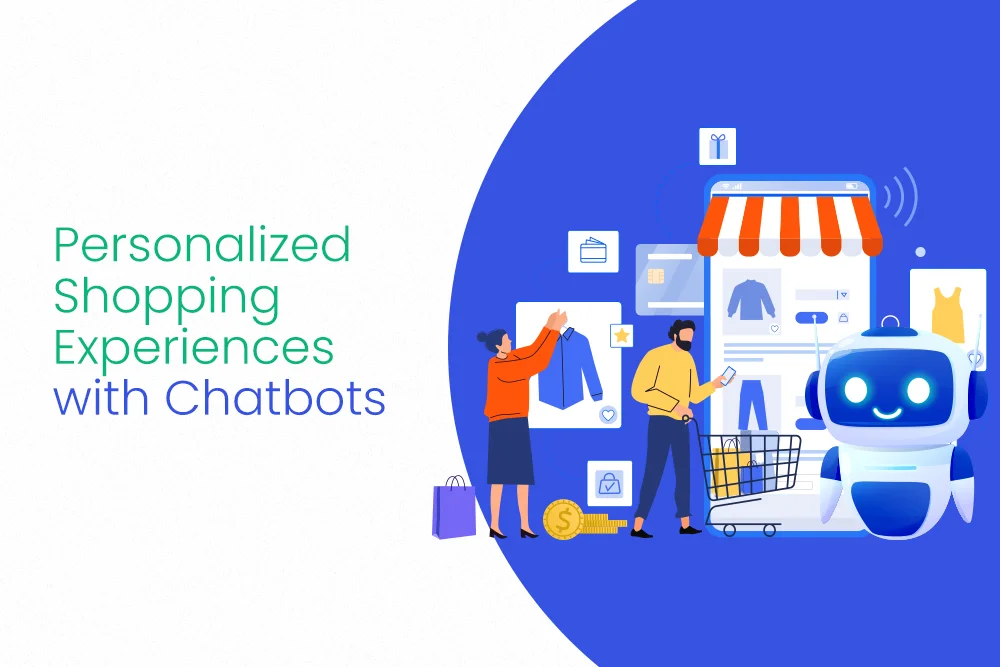As in retail and e-commerce, personalization has emerged as a golden key to unlocking customer satisfaction and loyalty. Amidst this evolution, chatbots have taken center stage, revolutionizing how businesses interact with their customers. This blog explores the transformative role of technology in delivering personalized shopping experiences, especially when it comes to chatbots for retail and e-commerce.
What Are Chatbots?
Imagine having a personal shopping assistant who knows your preferences, can answer your questions instantly, and is available 24/7. That’s what chatbots are! They are AI-powered virtual assistants designed to simulate conversations with human users online. From answering FAQs to recommending products, chatbots are equipped to handle various tasks, making shopping seamless and more enjoyable.
The Rise of Personalized Experiences
Customers crave experiences tailored to their needs and preferences in today’s fast-paced world. Personalization in shopping isn’t just a luxury; it’s a necessity. Shoppers are likelier to return to platforms that remember their size, favorite brands, and shopping history. This is where chatbots shine! They gather and analyze customer data to offer personalized recommendations, creating a custom-made shopping experience.
Chatbots in Retail and E-commerce: A Game-Changer
Streamlining Customer Service
Chatbots are redefining customer service by offering instant, on-demand assistance. They can handle everything, whether it’s tracking an order, resolving issues, or answering product-related queries. This efficiency enhances the customer experience and frees up human customer service representatives to tackle more complex issues.
Enhancing Shopping Experience
Retailers can offer a more engaging shopping experience by using chatbots. Chatbots can guide customers through purchasing, recommend products based on browsing history and preferences, and even upsell or cross-sell by suggesting related items. This personalized interaction increases the chances of conversion and boosts sales.
Providing 24/7 Support
One of the biggest advantages of chatbots is their availability. They can provide consistent customer support anytime, anywhere, ensuring shoppers’ queries are addressed promptly, regardless of time zones or holidays. This round-the-clock support significantly enhances customer satisfaction and loyalty.
Collecting Valuable Insights
Chatbots are a goldmine of customer data. They can track customer interactions, preferences, and feedback, providing businesses valuable insights. This data can improve product offerings, tailor marketing strategies, and enhance customer experience.
Saving Costs and Increasing Efficiency
Implementing chatbots can lead to significant cost savings for businesses. By automating routine inquiries and tasks, chatbots reduce the workload on human employees, allowing them to focus on more strategic activities. Moreover, chatbots’ efficiency and speed can lead to increased sales and customer satisfaction.
Overcoming Challenges
While chatbots offer numerous benefits, they also come with a set of challenges. Some of the hurdles are ensuring privacy and security, maintaining a human touch, and constantly updating the AI to understand and respond to complex queries. However, these challenges are being addressed with advancements in AI and machine learning, making chatbots more sophisticated and reliable.
Future of Chatbots in Retail and E-commerce
The future of chatbots for retail and e-commerce looks promising. With advancements in AI, chatbots are becoming more intuitive and capable of handling complex interactions. We’re moving towards a future where chatbots can predict customer needs even before the customer realizes them, making shopping experiences even more personalized and engaging.
Integrating Chatbots with Social Media Platforms
Social media platforms have become vital to the retail and e-commerce sectors, serving as powerful marketing and customer engagement channels. Chatbots seamlessly integrate with these platforms, providing instant customer service and personalized shopping experiences directly within social media messaging apps. This integration allows customers to inquire about products, place orders, and receive support while staying in their preferred social media environment. For businesses, this means tapping into where their customers spend considerable time, enhancing engagement and convenience.
The Role of Chatbots in Omnichannel Retailing
Omnichannel retailing is about providing a seamless and consistent shopping experience across various channels and devices. Chatbots play a crucial role in this strategy by ensuring that customers receive the same level of personalized service whether they’re shopping online from a desktop, a mobile app, or even in a physical store. For instance, a chatbot can assist customers in finding products online that they saw in-store or help them complete a purchase that started on one device but finished on another. This seamless integration across channels significantly improves the customer journey, leading to higher satisfaction and loyalty.
Leveraging Chatbots for Post-Purchase Support
The role of chatbots extends beyond just facilitating sales; they are also invaluable for post-purchase support. Chatbots can manage a wide range of after-sale services, from providing order updates to handling returns and exchanges. This improves the customer experience and reduces the burden on human customer service teams. By automating these processes, chatbots help maintain a positive relationship with customers even after a transaction has concluded, encouraging repeat business and fostering brand loyalty.
Personalizing Marketing Efforts with Chatbots
Chatbots are reactive tools and can proactively engage customers with personalized marketing messages. By analyzing customer data, chatbots can send customers tailored product recommendations, promotional offers, and reminders directly. This level of personalization ensures that marketing efforts are more targeted and effective, leading to higher engagement rates and increased sales. Moreover, chatbots can conduct surveys and gather feedback, providing valuable insights to inform future marketing strategies.
The Ethical Consideration of Chatbots
As chatbots become more integrated into the shopping experience, ethical considerations around privacy and data protection become increasingly important. Businesses must ensure that their chatbots are transparent in using customer data and comply with all relevant data protection regulations. Additionally, customers should be able to reach a human customer service representative easily. Addressing these ethical considerations is crucial for maintaining customer trust and ensuring the long-term success of chatbot implementations.
Looking Ahead: The Evolution of Chatbots
The evolution of chatbots in retail and e-commerce is far from over. Future AI and natural language processing developments will enable chatbots to understand and respond to customer queries with even greater accuracy and nuance. We may also see chatbots becoming more proactive, identifying and addressing potential issues before the customer is even aware. Furthermore, integrating chatbots with emerging technologies such as augmented reality (AR) could offer even more immersive and interactive shopping experiences. The potential for chatbots to transform retail and e-commerce is vast, and we are only scratching the surface of what is possible.
Conclusion
Chatbots have undeniably transformed the landscape of retail and e-commerce. By offering personalized, efficient, and 24/7 shopping experiences, they have enhanced customer satisfaction and driven sales and profitability. As technology advances, the potential of chatbots for retail and e-commerce is boundless. They are not just tools for automation; they are becoming indispensable allies in creating memorable and personalized shopping experiences. The era of chatbots in retail and e-commerce is just beginning, and it promises to bring even more exciting developments in the future.




